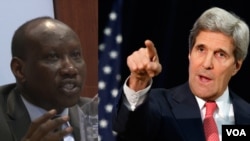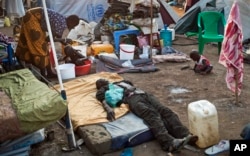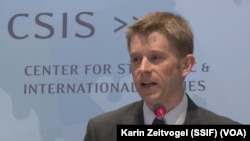WASHINGTON —
U.S. Secretary of State John Kerry called on the government of South Sudan Thursday to take "bold steps" to end the conflict that has brought the country to the edge of famine and forced more than a million people from their homes.
Speaking at a meeting with South Sudanese Minister in the Office of the President, Awan Riak, Kerry "raised the need for the Government of South Sudan immediately to stop the fighting, provide full humanitarian access, and cease harassment and threats against the UN Mission in South Sudan (UNMISS)," the U.S. State Department said.
Kerry also urged South Sudan’s leaders to "prioritize the interests of the South Sudanese people over their own personal or ethnic interests."
"The United States will continue to stand with the people of South Sudan and with those who take the courageous - and necessary - steps to bring peace, stability and good governance to South Sudan, so that its people can return to their livelihoods and its economy can flourish. But we will not stand by while the hopes of a nation are held hostage to short-sighted and destructive actors," the State Department quoted Kerry.
The two men met days after President Barack Obama signed an executive order, clearing the way for targeted sanctions to be imposed on anyone who fuels the conflict in South Sudan, obstructs the slow-moving peace process or commits rights abuses in the young country.
The State Department did not say if Kerry and Riak discussed the U.S. sanctions, but the South Sudanese minister talked to South Sudan in Focus on Wednesday after a panel discussion at the Center for Strategic and International Studies (CSIS). Riak said that his government was not worried by the threat of sanctions because it has been working to restore peace, not stoking violence.
Riak told the audience at CSIS that South Sudanese President Salva Kiir is drawing up a roadmap to take South Sudan back to peace and stability.
Among the cornerstones of the roadmap are a cessation of hostilities and the convening of a national dialogue that will include all South Sudanese. Both proposed messures are among the "bold moves" Kerry said the United States was looking for in South Sudan.
In a somewhat rambling speech, Riak also said the outbreak of fighting on December 15 took the government by surprise.
“We never expected that we would use the language of guns again," he said.
He never directly mentioned the possibility of the United States imposing sanctions on South Sudanese leaders, but he did say that South Sudan needs U.S. support, not punishment.
"I had a meeting with USAID and I mentioned that there is a need for the U.S. as a midwife of the birth of the country of South Sudan, not to abandon us at this time and say it is punishing (us)... If there is anything we need most, it is support, not just punishing us," he said.
Zach Vertin, a senior advisor to the U.S. Special Envoy to South Sudan and Sudan, and John Temin of the U.S. Institute of Peace jointly stressed the urgency of finding a solution to the crisis in South Sudan.
"We have heard in these past few days discussion of a possible famine in South Sudan, of 3.7 million people potentially at risk for starvation. At the same time we’re in the midst of a three-week break in negotiations in Addis on these issues," Temin said.
"I find that juxtaposition remarkable and sad," he said. Temin also dismissed reports that life has returned to normal in parts of the country, including the capital, Juba.
"I think 70,000 people living in U.N. camps is far from normal," he said.
"I think that people from certain groups not feeling safe to walk the streets of the capital city... is not normal. I think having a large contingent of a neighboring country’s army on your land is not normal and I think that having over one million people displaced because of the violence is far from normal."
"This is not a normal situation. It’s an extraordinary situation and an extraordinary situation requires a sense of urgency from all the parties, especially the protagonists who are doing the fighting. I’m not sure we’re seeing that sense of urgency right now," he said.
Vertin said the peace process -- which is on hold until the end of the month -- seems to be "stuck in tactics" and, echoing the words of Kerry, he called for "bold moves in Juba to unlock this situation."
Speaking at a meeting with South Sudanese Minister in the Office of the President, Awan Riak, Kerry "raised the need for the Government of South Sudan immediately to stop the fighting, provide full humanitarian access, and cease harassment and threats against the UN Mission in South Sudan (UNMISS)," the U.S. State Department said.
Kerry also urged South Sudan’s leaders to "prioritize the interests of the South Sudanese people over their own personal or ethnic interests."
"The United States will continue to stand with the people of South Sudan and with those who take the courageous - and necessary - steps to bring peace, stability and good governance to South Sudan, so that its people can return to their livelihoods and its economy can flourish. But we will not stand by while the hopes of a nation are held hostage to short-sighted and destructive actors," the State Department quoted Kerry.
The two men met days after President Barack Obama signed an executive order, clearing the way for targeted sanctions to be imposed on anyone who fuels the conflict in South Sudan, obstructs the slow-moving peace process or commits rights abuses in the young country.
The State Department did not say if Kerry and Riak discussed the U.S. sanctions, but the South Sudanese minister talked to South Sudan in Focus on Wednesday after a panel discussion at the Center for Strategic and International Studies (CSIS). Riak said that his government was not worried by the threat of sanctions because it has been working to restore peace, not stoking violence.
Riak told the audience at CSIS that South Sudanese President Salva Kiir is drawing up a roadmap to take South Sudan back to peace and stability.
Among the cornerstones of the roadmap are a cessation of hostilities and the convening of a national dialogue that will include all South Sudanese. Both proposed messures are among the "bold moves" Kerry said the United States was looking for in South Sudan.
In a somewhat rambling speech, Riak also said the outbreak of fighting on December 15 took the government by surprise.
“We never expected that we would use the language of guns again," he said.
He never directly mentioned the possibility of the United States imposing sanctions on South Sudanese leaders, but he did say that South Sudan needs U.S. support, not punishment.
We never expected that we would use the language of guns again.Awan Riak, South Sudan Minister in the Office of the President
"I had a meeting with USAID and I mentioned that there is a need for the U.S. as a midwife of the birth of the country of South Sudan, not to abandon us at this time and say it is punishing (us)... If there is anything we need most, it is support, not just punishing us," he said.
Zach Vertin, a senior advisor to the U.S. Special Envoy to South Sudan and Sudan, and John Temin of the U.S. Institute of Peace jointly stressed the urgency of finding a solution to the crisis in South Sudan.
"We have heard in these past few days discussion of a possible famine in South Sudan, of 3.7 million people potentially at risk for starvation. At the same time we’re in the midst of a three-week break in negotiations in Addis on these issues," Temin said.
"I find that juxtaposition remarkable and sad," he said. Temin also dismissed reports that life has returned to normal in parts of the country, including the capital, Juba.
"I think 70,000 people living in U.N. camps is far from normal," he said.
"I think that people from certain groups not feeling safe to walk the streets of the capital city... is not normal. I think having a large contingent of a neighboring country’s army on your land is not normal and I think that having over one million people displaced because of the violence is far from normal."
There is a need for the U.S. as a midwife of the birth of the country of South Sudan, not to abandon us at this time and say it is punishing (us).Awan Riak
"This is not a normal situation. It’s an extraordinary situation and an extraordinary situation requires a sense of urgency from all the parties, especially the protagonists who are doing the fighting. I’m not sure we’re seeing that sense of urgency right now," he said.
Vertin said the peace process -- which is on hold until the end of the month -- seems to be "stuck in tactics" and, echoing the words of Kerry, he called for "bold moves in Juba to unlock this situation."














